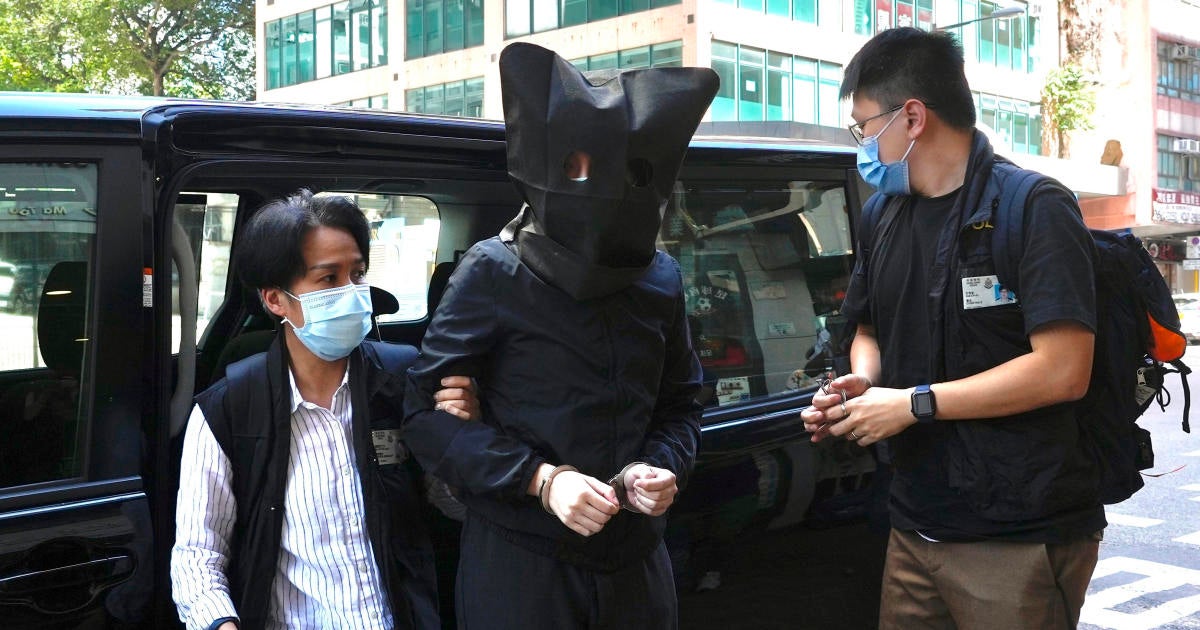Hong Kong — President Xi Jinping further tightened his grip on power in China this week. After a decade in power, he is expected to be anointed by the Communist Party he leads for another term. His assertive approach at home and abroad has led to increasingly tense relations with neighboring island Taiwan, and a dramatic tightening of control over Hong Kong.
Hong Kong was a British territory for more than a century, allowing it to develop an open civil society and vibrant free press. But China assumed control of the territory in 1997 and under Xi Jinping the Communist Party has cracked down hard on dissent. A key element of that crackdown has been a slow but concerted stifling of freedom of speech.
One high profile case has highlighted China’s intolerance of criticism.
In the summer of 2021, Hong Kong national security police arrested five young speech therapists for their part in an alleged “conspiracy to distribute seditious materials.”
Vincent Yu/AP
Their crime: Publishing three children’s books about a village full of sheep. The books were thinly disguised political allegories about China’s takeover of Hong Kong.
District Court Judge Kwok Wai-Kin ruled that some of the material in the books had “a seditious intent,” and brought “hatred against the government.”
Hongkongers used to enjoy some of the liveliest, freest speech in the world, until China took over in 1997. In 2020, in reaction to a strong pro-democracy movement, China’s central government imposed a vague new national security law, which, in effect, can be used to silence any criticism of Beijing’s governance and policies.
It’s working.
Under intense pressure from Beijing, Hong Kong’s government has shut down independent news outlets. The respected Apple Daily newspaper was not only forced to close but its senior staff were sent to jail. This summer, when Hong Kong’s huge, internationally renowned book fair opened, there were no books on display with any kind of political edge.
“They don’t want journalism to be a check on government,” Keith Richburg, head of journalism at Hong Kong University, told CBS News. “They don’t want anyone to be a check on government.”
For anyone who dares to cross the new red lines, “the penalties can range up to life in prison,” said Richburg, who spent decades writing for the Washington Post. “No possibility of parole — you can’t really defend yourself against these things.”
The publishers of the children’s books did try to defend themselves. Their lawyers argued the books would help kids understand systemic injustice.
Vincent Yu/AP
Authorities, however, determined that the sheep characters were not-so-thinly-disguised pro-democracy Hongkongers, and the predatory wolves — Chinese authorities. That crossed the red line. Each of five the publishers was sentenced to just over a year and a half in jail.
“I wouldn’t say press freedom is dead entirely” in Hong Kong, Richburg said, noting that there are a couple major newspapers operating in the region “that are still trying to show some balance.”
Veteran Hong Kong pro-democracy politician Emily Lau told CBS News she believed freedom of speech in Hong Kong, “may be in intensive care or something, and it’s very sad. But we still have journalists operating. We have TV stations, newspapers and so on. But some journalists, as you probably know, are in prison and many have gone abroad, and many of the news organizations are very careful about the stories that they’re allowed to be published.”
Richburg also noted “a lot more self-censorship, because people don’t know where the new red lines are under this national security law.”
He sees that as a tactic by Beijing, not an oversight.
“I think they deliberately like it vague,” Richburg said. “Every time the media has asked for clarification on some of these things, they won’t tell you. They basically say, you know, ‘We will know you’ve crossed it once you’ve crossed it.’ And I think that keeps everybody on their toes.”
“The boundaries are very vague,” agreed Lau. “You just don’t know when you step on the red line, and then you could be arrested and could be put in jail, maybe for a year or two years, with no trial. So, it is very, very distressing.”
The image, widely published, of the speech therapists, hooded and handcuffed is a warning. And it’s working.
For all the latest World News Click Here
For the latest news and updates, follow us on Google News.

